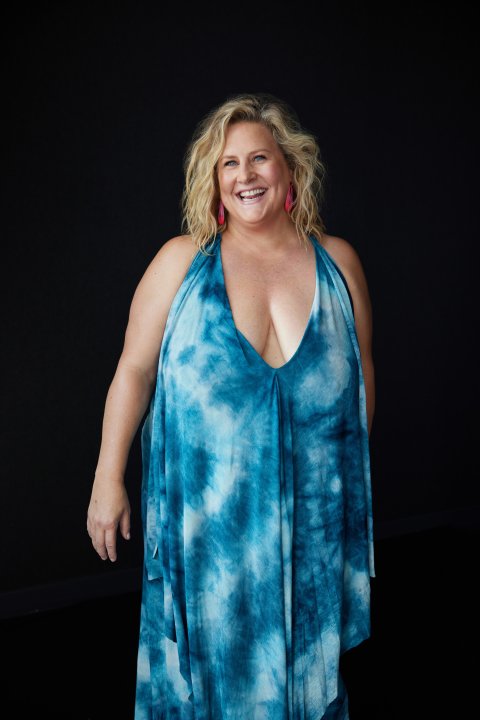
"You don't see a lot of women in their 50s, a plus-size woman in her 50s, as a lead character on a show."
Bridget Everett never thought she'd be the lead of a TV show. "I come from the downtown world in New York, a cabaret singer, and these things just don't happen, you don't find yourself with three seasons of HBO. It just doesn't happen." But it happened. On Somebody Somewhere (October 27), Everett plays Sam, a woman struggling through a midlife crisis with the help of her family and colorful friends in rural Kansas. Set in her actual hometown, Everett says, "it's a lot of me that you're seeing, warts and all." "Even if you don't look like the people on the screen, you can relate to the things that they're going through.... Whether we're fat or we're short, or we're queer or whatever—we happen to all be those things—but that's not the focus. The focus of the story is just the human condition." And in season three we see just how far Sam has gone in her funny (sometimes uncomfortable) journey to find herself. "Her in season three is learning to love yourself is the greatest love of all. Whitney [Houston] said it first, Whitney said it best, but you know what? It's still true."
SUBSCRIBE TO THE PARTING SHOT WITH H. ALAN SCOTT
ON APPLE PODCASTS OR SPOTIFY
Editor's Note: This conversation has been edited and condensed for publication.
I love this show so much! Are you surprised you're going into your third season?
That's kind of the big thing, that it feels like a dream, honestly. And I think that at some point, when we're done talking about it and I'm sitting there reflecting on it, that'll it'll probably be an very overwhelming feeling. I come from the downtown world in New York, a cabaret singer, and these things just don't happen, you don't find yourself on HBO, you don't find yourself with three seasons of HBO. You don't get to do it with your friends. It just doesn't happen.
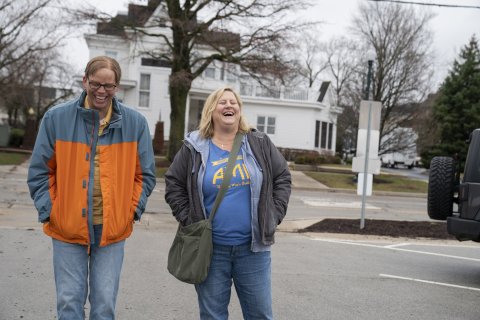
But it did, and it's so great. Where did the idea for the show come from? How did it come about?
Paul [Thureen] and Hannah [Bos] created it, they dreamt up the world. And then from there, we've all been really collaborative. And there's a sort of a central group of Paul, Hannah, me and Carolyn Strauss [executive producer] that are kind of the creative center of the show. But we definitely collaborate with our writers and directors and everybody. And the more we did it, the more I infused more of myself in it. And so it's a lot of me that you're seeing, warts and all. I hope people like that.
It's so rare to see a depiction of small-town America on TV. What about the small-town aspect that stands out to you?
Well, I'm from there. I'm born and raised there. I have family still there. My brother still lives there. He still runs the Hilton Garden Inn, and my other brother lives in Kansas City, and he's a school teacher. So I'm deeply rooted there. When Paul and Hannah pitched the idea of it happening in Kansas, it originally was gonna happen in Emporia, Kansas, which is not where I'm from. And then I was like, we were all in the cars, let's just go drive to Manhattan [Kansas], and say hi to my mom. And then we got there, we're like, this is it. And I was really excited by the idea, but I was also terrified, because you don't want to misrepresent your home, right? And you want and everybody from Paul and Hannah to HBO, Amy Gravitt, our executive there, like it was. We didn't want to, like, look down on Manhattan. We wanted to just feel like another place, another place where people live, where these people live. Both of my brothers, they text me after like, you did good, very Kansas.
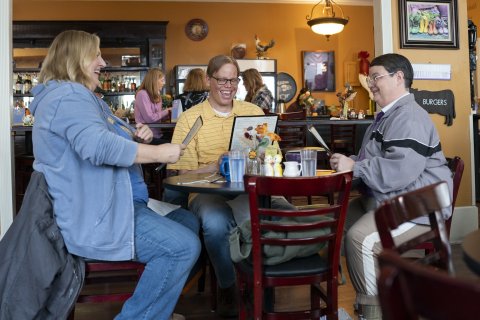
What I think makes the show stand out is the diversity of the cast. It's not something you see in every depiction of small-town America. Did that stand out to you?
Yeah, I think the people that populate the universe of the show, it does feel unique, but not to me, because those are the people in my life. Murray Hill, who plays Fred Rococo, is a very close friend of mine. Mary Catherine [Garrison] was my roommate. Jeff [Hiller] I've known for year [and] I've gotten to know much better through the show, of course. And then Tim Bagley is a friend, and the part was written for him, who plays Brad. These are people that I find that I'm drawn to, and I want them to be a part of this world, and I think that people respond to it because you don't get to see people like this necessarily. There's all different kinds of people that you don't see on TV, but you don't see a lot of women in their 50s, a plus-size woman in her 50s, as a lead character on a show. I just think that there's something very simple about the show that sometimes in the beginning I felt like might not be enough to draw in an audience. But I was really wrong. I think Carolyn Strauss, who is one of our executive producers and used to be a head honcho at HBO, she's very smart, and she's like, "No, there's something very special about this show." I do wish our audience was bigger because, because I think even if you don't look like the people on the screen, you can relate to the things that they're going through and the slice-of-life-ness of it.
There is sort of an excitement to having a niche audience, because for fans like me, when you come across another fan, it's like we're in on a secret or something.
I feel like that's been my whole career. Like my cabaret shows are kind of a secret for certain people. But I also like that it's not huge, that it speaks to a certain group of people, although I think that there were more people that would enjoy it, should they catch on to it, and hopefully it'll continue to find its audience. I don't think it's a show that's gonna go out of style, really, because it's about finding your people. It's about community. It's about growth. It's about quiet moments between people, and that's something that everybody can relate to. It's not plot driven, there's not like sh** blow it up, you know? It's just about growth and life. It does move at a slower pace, but I also think there's a lot that goes on that'll keep you laughing and keep you engaged. It really is its own kind of thing. I feel really lucky that we're at HBO, because they've given us three seasons of a very special gift, and they've really supported it. They love it. It matters that they gave us this chance, and that they put people like us on screen.
What can we expect from this next season?
Well, the theme that we use in the writer's room was, [and] it's also on my necklace that Paul and Hannah gave me, is G.A.A.O.—growth against all odds. And I think that that is seeing Sam move through her fears and trying even though she doesn't want to. I think in season one and two, she's kind of pinpointing where some of her shortcomings are. But in season three, she wants to push through them and she has Joel [played by Jeff Hiller] as her person. He loves her in a way that she can't love herself. And I think that her in season three is learning to love yourself is the greatest love of all. Whitney [Houston] said it first, Whitney said it best, but you know what? It's still true.
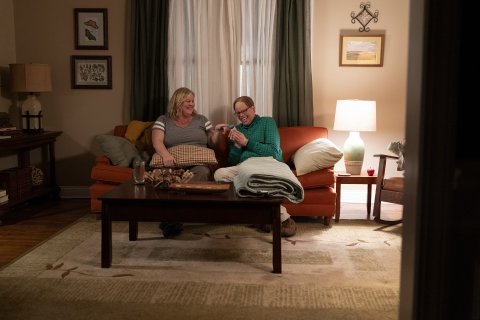
Because the character is so close to who you are, do you find yourself ever struggling with exposing too much of yourself in your performance?
Yeah, but I feel like that for me, in the stuff that I do, if I can't see myself in it, I can't do it. I'm not Mary Catherine, who is an incredible actor and can play any part and you would love her. It has to be something that I can emotionally lock into, that I have had some sort of common experience with. But I can always be like, if I'm really embarrassed about something, well, that's Sam, that's not me. But the writing process and the way that we develop this show is so respectful, and I never feel exploited. I never feel anything like that. I just feel like we're presenting someone with real struggles and value and that this person also has interest just because they're not a size two, or they're not 25 years old or whatever. I think that Sam has to take the time she needs to get where she's going. And I still know where she could go next, so maybe there'll be a movie one day or something. But I feel like we've done it with care, and I feel proud of how it came out.
I think you're right about the uniqueness of your character and just you as a lead of a show. It's rare but it's also why so many fans are excited about the show.
Whether we're fat or we're short, or we're queer or whatever, we happen to all be those things, but that's not the focus of the story. The focus of the story is just the human condition. Like in this season, Sam goes to the doctor, her knees [are] bothering her, and it's like everything else that comes up, because there's no way Sam's gonna go to doctor, and her doctor's not gonna be like, "Okay, b****, you're not taking care of this. You're not taking care of that." Like that's reality. So, I think that you can bring up things in that way. But when Sam goes to the doctor, it's less about what's wrong with her, it's more about how what's meant to come across is that Sam doesn't feel like she needs to take care of herself. Because why bother? And there's always people around Sam trying to be like you, "You matter." And I think a lot of people feel that way. A lot of people are like, "Well, I'm not going to go the doctor. Because who cares?" Or, "I'm not going to do this." I don't think it's that uncommon. I think when I talk about self-worth, and how Sam struggles with self-worth, I struggle with self-worth, I know that that is a thing a lot of people struggle with. And I think that we just handle it in the way that we're handling it, and some people respond to it.
And the thing about you and the cast that people respond to is this theme of chosen family, particularly your character and Hiller's Joel. What do you make of the family dynamic of this cast?
I wanted the people in the show to reflect the people in my life. Like the other characters in the show are largely in service of what's happening with Sam, but it's so much more interesting because we know more of who they are, they are fully realized people. They are interesting. They have just as many complexities as Sam does. And that's been important to us all along. We always want to go deeper with the characters. Like getting to know Brad this season, played by Tim Bagley. He's made an incredible career out of playing the same thing, and this is an different opportunity for him, and he just explodes in the season. He's incredible. I just love him so much. And then Mary Catherine gets to do all these different things. It's so gratifying to meet these people in a full fashion, like to meet all of them. When we're writing scenes, it's like, how can we feel the most out of this person? Even if it's just getting Sam and Joel from A to B, what can we put in there that is revealing about them? How is this gonna make sense? Just because I'm number one on the call sheet, there's enough about me, let's get to know everybody.
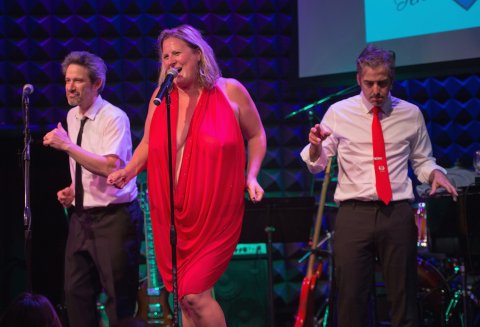
What sort of reactions have you heard from people about the show? I can imagine it's interesting when they see one of your live shows.
I can tell that they know me from the TV show [when they come to a show]. Like, "Oh, I'm gonna get a seat right up front." I'm like, "Oh, careful." Murray comes to a lot of my shows, and he'll be up in the sound booth, and he'll be like, "Hear that kid? That's a TV bump." Like you don't have to work as hard, people are already on your side. And historically, when people don't know who you are, you got to spend the first 20 minutes winning them over, and then the next 40 minutes trying to carry them away. But I can feel the TV show has an impact, and the live show has a different kind of impact, but what's important to me is that they have an impact, that people feel a shift of some kind. And I think, for my live show, I want people to feel, I want them to let go, and for the TV show, I want them to lean into them.
Because of how wild your live performances are, and how funny you can be, in those tender moments, the dramatic moments, do you struggle with not making it funny? Like the natural instinct of a comic.
I worry about it not being funny sometimes, because I'm just trying to just be close to the bone as possible. Like, I'm not trying to go too hard. We always say, don't put anything on it, just go in there and say that. And we all kind of do it because Tim and Jeff and Murray and I are all like from the stage. But it's always when you strip all that away, and you just are talking like we're talking in a room together, those are the best moments of the show and that's what always ends up on the screen.
About the writer
H. Alan Scott
A writer/comedian based in Los Angeles. Host of the weekly podcast Parting Shot with H. Alan Scott, ...
Read more
To read how Newsweek uses AI as a newsroom tool, Click here.





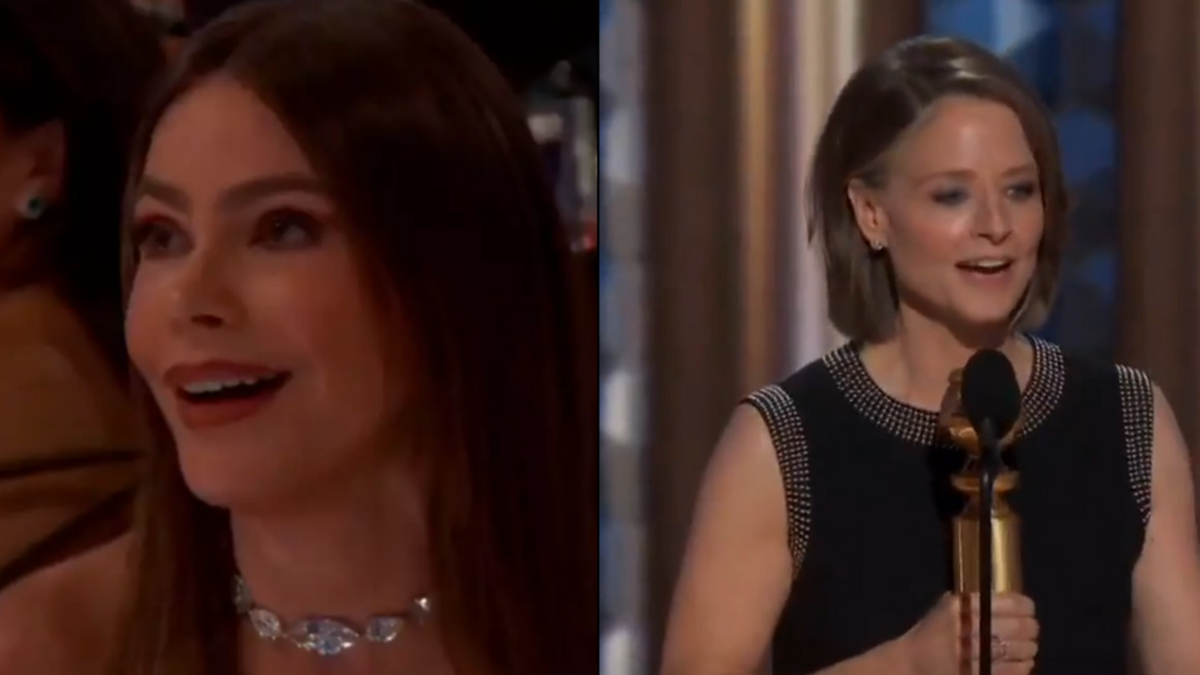


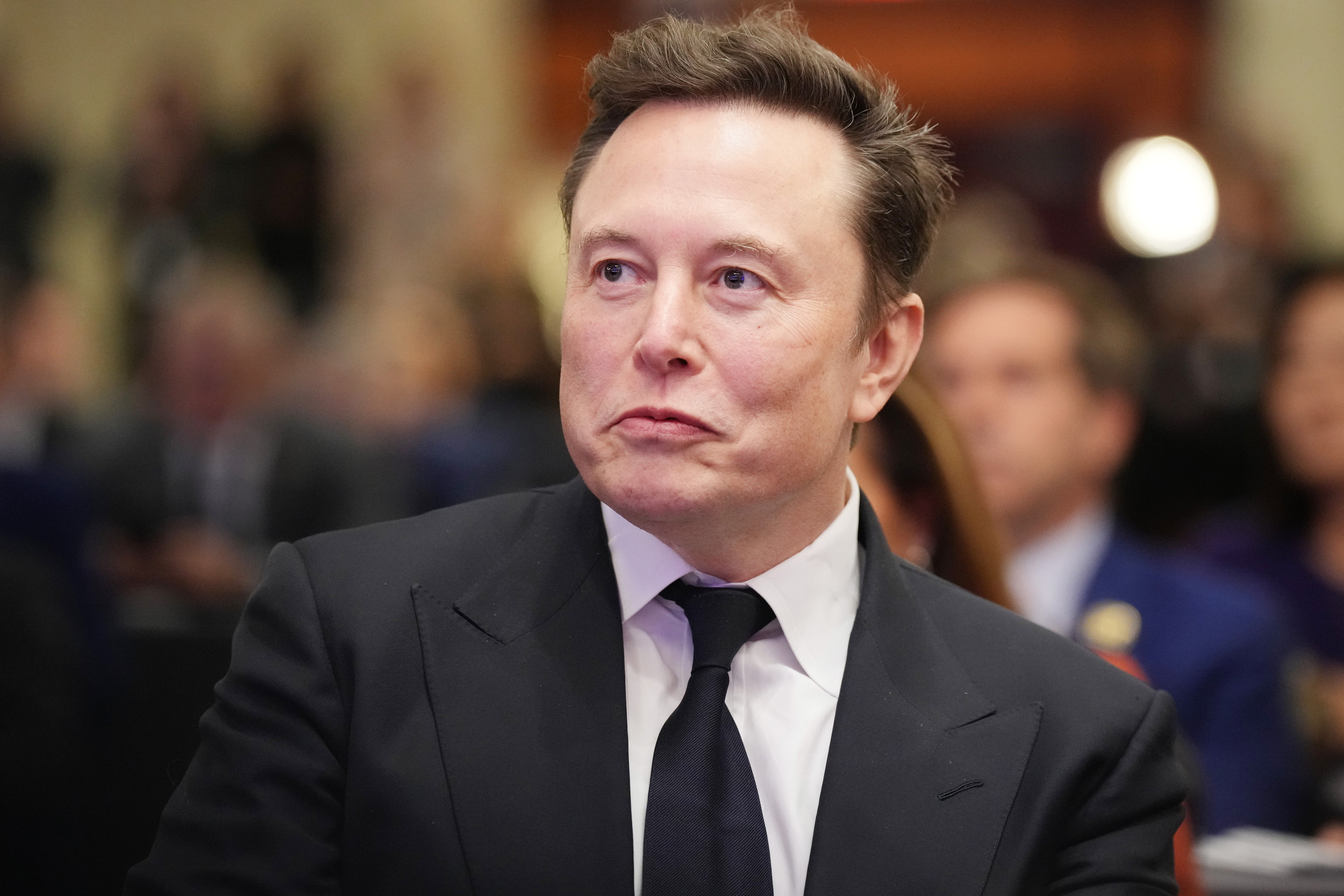










:quality(85):upscale()/2024/04/24/878/n/3019466/36c5693c662965c5d1ce91.72473705_.jpg)
 English (US) ·
English (US) ·